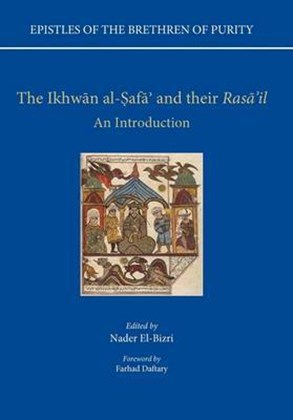The Ikhwān al-Ṣafaʾ and their Rasāʾil An Introduction
Oxford University Press in association with the Institute of Ismaili Studies
Ikhwān al-Ṣafaʾ (The Brethren of Purity) were the anonymous adepts of a tenth-century esoteric fraternity of lettered urbanites that was principally based in Basra and Baghdad. This brotherhood occupied a prominent station in the history of science and philosophy in Islam due to the wide reception and assimilation of their monumental encyclopaedia: Rasāʾil Ikhwān al-Ṣafaʾ (The Epistles of the Brethren of Purity). This compendium contained fifty-two epistles that offered synoptic explications of the classical sciences and philosophies of the age. Divided into four classificatory parts, it treated themes in mathematics, logic, natural philosophy, psychology, metaphysics and theology, in addition to moral and didactic fables. The Ikhwān were learned compilers of scientific and philosophical knowledge, and their Rasāʾil constituted a paradigmatic legacy in the canonization of philosophy and the sciences in mediaeval Islamic civilization.
This present volume gathers studies by leading philosophers, historians and scholars of Islamic Studies, who are also the editors and translators of the first Arabic critical editions and first complete annotated English translations of the Rasāʾil Ikhwān al-Ṣafaʾ, which will be published in the OUP Series that this present volume initiates, as well as being members of the Editorial Board.
The chapters of this present volume explore the conceptual and historical aspects of the philosophical and scientific contents of the Rasāʾil and their classification, as well as investigating the authorship and dating of this corpus and the impact that the Ikhwān’s intellectual tradition exercised in the unfolding of the history of ideas in Islam.
Acknowledgements
Foreword, by Farhad Daftary
Prologue, by Nader El-Bizri
1. Why We Need an Arabic Critical Edition with an Annotated English Translation of the Rasāʾil Ikhwān al-Ṣafāʾ
Ismail K. Poonawala
2. The Classification of Knowledge in the Rasāʾil
Godefroid de Callataÿ
3. The Arrangement of the Rasāʾil Ikhwān al-Ṣafāʾ and the Problem of Interpolations
Abbas Hamdani
4. The Scope of the Rasāʾil Ikhwān al-Ṣafāʾ
Carmela Baffioni
5. The Rasāʾil Ikhwān al-Ṣafāʾ in the History of Ideas in Islam
Ian Richard Netton
6. Misled and Misleading . . . Yet Central in their Influence: Ibn Taymiyya’s Views on the Ikhwān al-Ṣafāʾ
Yahya Jean Michot
7. Epistolary Prolegomena: On Arithmetic and Geometry
Nader El-Bizri
8. Music and Musicology in the Rasāʾil Ikhwān al-Ṣafāʾ
Owen Wright
9. Reading The Case of the Animals versus Man: Fable and Philosophy in the Essays of the Ikhwān al-Ṣafāʾ
Lenn E. Goodman
Contributors
Select Bibliography
Index
‘The publications that are planned within this project will no doubt rekindle the interest of scholars and students of Islam in Islam's rich cultural, educational and historical legacy . . . The work of the Ikhwan al-Safa, like many other works that make up the classical Muslim educational thought, need to be seriously studied and reflected upon. This new publication project contributes immensely towards realizing this educational aim.’
– Abdullah Sahin, Muslim World Book Review - about Epistles of the Brethren of Purity series
‘The project team, led by the editor Nader el-Bizri, are to be congratulated for collecting the leading specialists on this important early corpus of texts to produce a work that will whet the appetite of those awaiting the editions and translations.’
– Sajjad H. Rizvi, Journal of Islamic Studies
Nader El-Bizri is a Research Associate in Philosophy at The Institute of Ismaili Studies, London, a Chercheur Associé at the Centre National de la Recherche Scientifique in Paris, and a Visiting Professor at the University of Lincoln. He also lectures at the Department of History and Philosophy of Science at the University of Cambridge, and previously he has held a lectureship at the University of Nottingham and taught at Harvard University and the American University of Beirut. He has had numerous articles published in philosophy journals and is the author of The Phenomenological Quest between Avicenna and Heidegger (Global Publications, Binghamton, NY). He is also an elected member of the Steering Committee of the Société Internationale d’Histoire des Sciences et des Philosophies Arabes et Islamiques (CNRS, Paris), and is a co-editor of a book series on phenomenology (Kluwer Academic publishers, Dordrecht), and serves on the editorial board of a series on philosophy and architecture (Lexington Books, Maryland). Besides his academic undertakings, he has nine years of professional architectural consulting experience in institutions in Geneva, London, Cambridge, New York, Boston, and Beirut.

